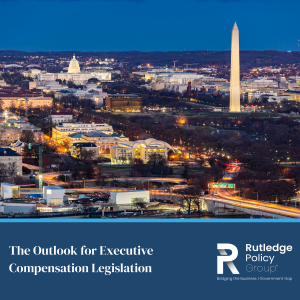 Executive compensation programs provide tax advantages that help corporations hire and retain talent. As the Biden Administration and the 117th Congress look for more revenue-raising opportunities, we expect the general push will lean toward cutting back on these tax advantages.
Executive compensation programs provide tax advantages that help corporations hire and retain talent. As the Biden Administration and the 117th Congress look for more revenue-raising opportunities, we expect the general push will lean toward cutting back on these tax advantages.
This legislative trend is already underway. The recently enacted American Rescue Plan (COVID-19 relief package) included a change to Internal Revenue Code (IRC) Section 162(m) covering corporate deductions for executive compensation. Effective after December 31, 2026, the bill increased the number of executive employees for whom companies cannot deduct compensation above $1 million from five to ten, including the CEO and CFO.
Which Proposals Will Become Law?
Currently, there are a number of other legislative proposals related to executive compensation under consideration. At this time, there is no way to know which of these proposals are most likely to become law. My expectation is that one or more of these three proposals are most likely to be codified into law as the legislative process unfolds throughout the rest of the year.
- Deduction for Compensation
This proposal (released on February 2, 2021) would not permit deductions for compensation in excess of $1 million for any employee of a publicly traded company, not just the top ten.
- Deferred Compensation
This proposal (released on February 27, 2020) would amend IRC Section 409A to require nonqualified deferred compensation and equity-based compensation to be included in gross income, and therefore taxed, upon vesting. Thus, inclusion in gross income could continue be conditioned on the future performance of substantial services — but could not, for example, be conditioned on achieving specified performance goals. Employees that are not highly compensated under the IRC are carved out of the new rules. This proposal would have a significant impact on the compensation programs of both publicly traded and privately held corporations. This provision was also proposed in 2017 as part of Tax Reform that year, although it was not included in the final legislation.
- Pay Ratio
This proposal (released on March 17, 2021) would incrementally increase the tax rate for corporations whose CEO-to-median worker compensation ratio is more than 50:1 — up to a maximum 5% increase in the corporate tax rate if the pay ratio is more than 500:1. This proposal would apply to corporations with gross receipts of $100 million or more per year.
Schedule a Consultation
At this time, it’s impossible to predict which proposal(s) will be enacted into law, and when. As new laws get written, it will be important for corporations to understand which proposals will have the greatest impact on their businesses. It’s also vital that companies have a voice in the process — and knowing who to talk to will be key.
As a former Naval Officer, I think businesses are sailing through fog on these proposals. You need radar! Fortunately, Rutledge Policy Group can be that radar. We provide the analysis, advice and advocacy that companies will need as taxation rules for executive compensation evolve. We will provide your company with the non-partisan, business-centric knowledge needed to navigate the developing legislation that will govern the future taxation of executive compensation.
Contact us today to schedule a complimentary consultation to learn how we can be of help.

